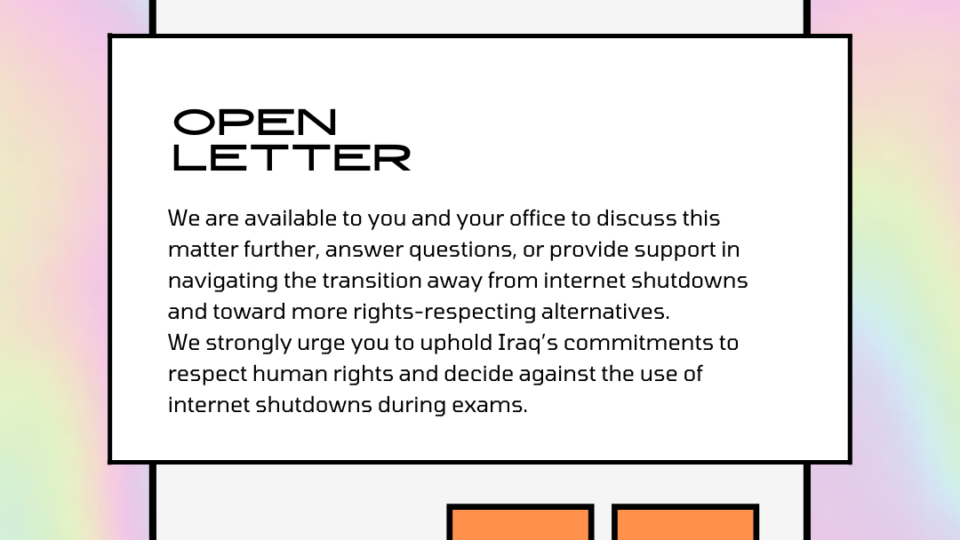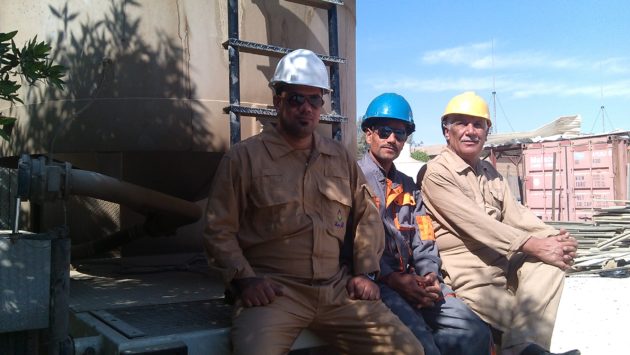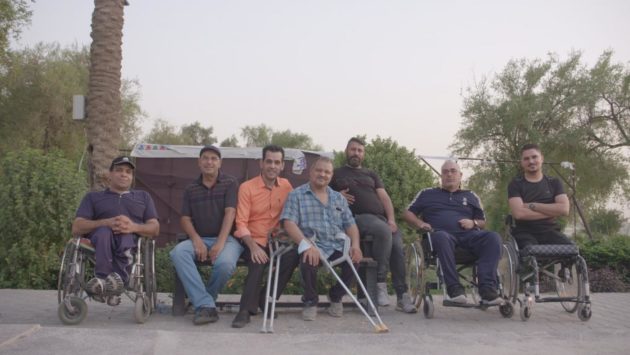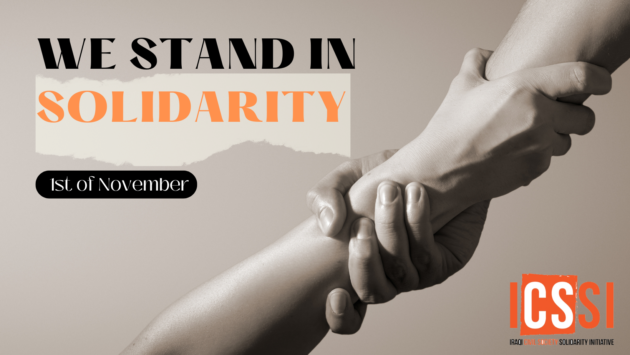Open Letter To: Mohammed Shia’ Al Sudani
Open Letter: The Prime Minister of Iraq must commit to #KeepItOn at the upcoming cabinet meeting, and put an end to internet shutdowns during exams
To: Mohammed Shia’ Al Sudani, Prime Minister of Republic of Iraq;
The Office of the Prime Minister
Cc: Ibrahim Al-Jubouri, Minister of Education;
Hayam Al-Yasiri, Minister of Communication
Your Excellency the Prime Minister, Mohammed Shia’ Al Sudani
We, the undersigned civil society organizations and members of #KeepItOn coalition — a global network of over 300 organizations from 105 countries working to end internet shutdowns— write to urgently appeal to you, and all relevant authorities, to join us in defending human rights for all people in Iraq and committing to #KeepItOn during next month’s exams at the upcoming cabinet meeting.
Iraq is one of a small group of countries that has repeatedly resorted to internet shutdowns as a tool to prevent cheating or leaking of school exams. According to the Office of the High Commissioner for Human Rights (OHCHR), exam related disruptions, which often take the form “blanket shutdowns,” impose “unacceptable consequences for human rights and should never be imposed.” For years, we have called on the Iraqi government to end this repressive and disproportionate practice, and to that end, we strongly welcomed the Ministry of Communication’s bold decision to reject the request from the Ministry of Education to implement a shutdown during the Baccalaureate Exams scheduled for June 2023. However, we’re equally concerned by the recent statement made by the Minister of Education, who sees internet shutdowns as a “positive step” and a necessary “precautionary measure widely used around the world” during exams.
As the Iraqi cabinet sets to meet and discuss this measure tomorrow, we would like to highlight to your attention that there is little to no evidence available to demonstrate that internet shutdowns are actually effective in preventing cheating on exams, and the overwhelming majority of countries around the world successfully undertake national exams without resorting to this blunt-force measure. Just in the past few years, we have witnessed multiple leaks of exam questions during Iraq’s national exam periods despite internet shutdowns being in place, making it clear this tactic is not effectively upholding the integrity of the national exam process. There is significant evidence, however, for the harms that internet shutdowns impose whenever they are implemented. People and businesses in Iraq have been impacted by this disproportionate measure, which has denied millions of the ability to exercise their fundamental rights. When the internet is shut down, businesses and economies suffer. Just between July 2015 to June 2016, Iraq has lost more than USD $209 million in economic growth due to internet disruptions in the country. Shutting down the internet, even for a short period during the exams, has far-reaching consequences on Iraq’s national economy and disproportionately harms people across the nation.
Such a negative impact has become even more pronounced as the Iraqi government moved to digitize its services and transactions — all of which come to a ground halt every year during the exam-related internet shutdowns. Every year, people across Iraq take to social media to share their personal stories about how they have been impacted by such a measure. Businesses, start-ups, transportation apps, banks, delivery workers, and people from all walks of life relying on unfettered social media and internet access for their work are impacted and are “unable to do [their] work.”
Interfering with internet connection to limit people’s ability to communicate, express themselves, and access necessary information during emergencies and crises constitutes a violation of the fundamental right to freedom of expression, as outlined in Article 19 of the Universal Declaration of Human Rights and the International Covenant on Civil and Political Rights (ICCPR). The international community strongly condemns internet shutdowns, as evident in the United Nations Human Rights Council Resolution 47/16, which denounces “the use of Internet shutdowns to intentionally and arbitrarily prevent or disrupt access to or dissemination of information.” In a recent report on internet shutdowns, the Human Rights Council highlights the trends, causes, legal implications, and impacts on various human rights, urging authorities not to impose internet shutdowns. The UN High Commissioner for Human Rights has emphasized that “switching off the internet causes incalculable damage, both in material and human rights terms” while “the costs to jobs, education, health and political participation virtually always exceed any hoped for benefit.”
Article 4 of the ICCPR allows states to “take measures derogating from their obligations under the Covenant to the extent strictly required by the exigencies of the situation.” According to the UN Human Rights Committee, this requirement must reflect “the principle of proportionality which is common to derogation and limitation powers.” In other words, “any derogation measure shall be such only as are strictly necessary to deal with the threat to the life of the nation and are proportionate to its nature and extent.” Internet shutdowns disproportionately affect all users and needlessly restrict access to information and emergency communication services during critical moments, making them “disproportionate by default.”
Given Iraq’s history of using internet shutdowns during other moments of national importance, including during protest, we urgently call on you to make a firm commitment to #KeepItOn at all times, bring an end to this draconian, yet ineffective, practice, and ensure the people of Iraq will have safe, open, and unfettered access to the internet during exams.
We are available to you and your office to discuss this matter further, answer questions, or provide support in navigating the transition away from internet shutdowns and toward more rights-respecting alternatives.
We strongly urge you to uphold Iraq’s commitments to respect human rights and decide against the use of internet shutdowns during exams.
Signatures
Access Now
SMEX
Internet Society (ISOC)
INSM Network for Digital Rights in Iraq




